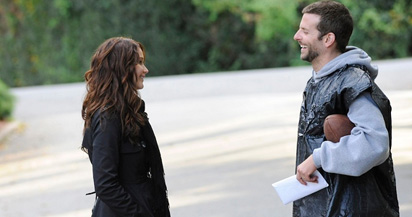The 400-Word Review: Silver Linings Playbook
By Sean Collier
November 23, 2012
Audience expectation is essential to the quality of many films. The perspective a moviegoer enters the cinema with can change the effectiveness of a movie, lending a certain subjectivity to the success of an ambiguous work.
David O. Russell’s Silver Linings Playbook is just such a film. If a viewer has been swept up in the film’s Oscar buzz and prestige-pic trappings, and walks into the theater expecting a drama, they’ll be disappointed by an ultimately frivolous picture. If a viewer expects a romantic comedy, though, only knowing the film by its charming leads, they’ll find an above-average effort.
Pat (Bradley Cooper) is an ex-teacher recently — and prematurely — removed from a mental hospital by his uncomprehending mother (Jacki Weaver, who often owns her scenes.) He’s committed after finding his wife in the shower with another man; Pat blacked out, nearly killed the interloper and took a plea bargain. Despite a pesky restraining order, he’s determined to reunite; when he meets Tiffany (Jennifer Lawrence), a similarly affected misfit with ties to the estranged bride, he thinks he has an in.
The busted dinner party where Pat and Tiffany are introduced is as clichéd a meet-cute as you’re likely to find, and their unconventional courtship — Tiffany agrees to pass a message along, provided that Pat enter a high-society dance competition with her — is hackneyed. Fortunately, Silver Linings Playbook is given its life by Lawrence, who wrenches a nuanced, compelling and likable character out of Tiffany, more true-to-life than anything else within a hundred yards. A loosely intertwined subplot about Pat’s father, a bookie with big dreams (Robert de Niro, back to form), also keeps the wheels turning — more effectively than the main plot, in fact.
A romantic comedy with likable characters, great performers and at least one laudable portrayal? Certainly above average for the genre. If you’re expecting anything more, though, Silver Linings Playbook loses a lot of its charm. The very real mental difficulties faced by Pat and Tiffany are paid only lip-service; apparently, all you need to combat crippling emotional problems is a dance competition and a win from the Philadelphia Eagles.
In the end, there are no messages or morals more profound than those of a popcorn date flick — trust, faith and true love, and little more. A perfectly acceptable little movie, then. Even if it thinks a bit too highly of itself.




